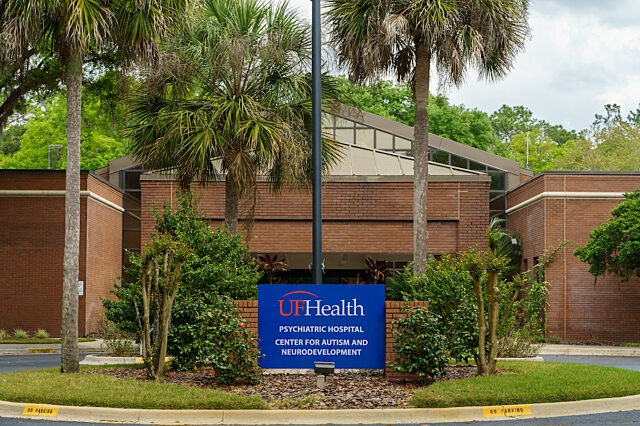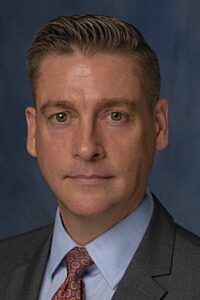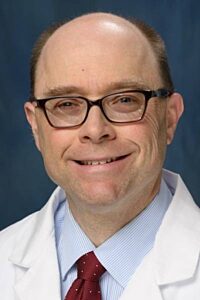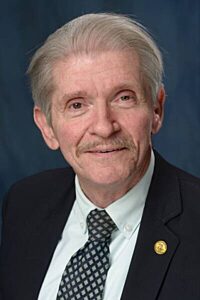UF Health Psychiatric Hospital
Address
Gainesville, Florida 32606
Phone Numbers
Hours of Operation
See full hours
UF Health Psychiatric Hospital is located on a private, picturesque, 18-acre campus that offers comfort and serenity to people in crisis. Our 81-bed facility provides a full range of confidential, effective services.
If you are in a crisis, call 988
If you or someone you know is struggling or in crisis, help is available at any time. Call or text 988 and you will be connected to a trained counselor.
Visitation hours
- East Unit: From 5 p.m. to 7 p.m.
- North Unit: From 5 p.m. to 7 p.m.
- South Unit: From 5 p.m. to 7 p.m.
- West Unit: From 5 p.m. to 7 p.m.
Please call (352) 265-5481 for questions regarding visitation hours.
Inpatient information
UF Health Psychiatric Hospital consists of a child/adolescent unit, an adult inpatient addiction unit, two adult inpatient psychiatric units and a geriatric psychiatry unit. Inpatient care in our units focuses on providing a safe, highly supervised setting for effective treatment. After an initial patient assessment, a multidisciplinary treatment team of UF Health physicians and clinicians will determine the best level of care and formulate an individualized treatment plan for each patient. The treatment plan identifies problems, interventions and goals designed to facilitate the patient’s return to the community, or to the least restrictive environment possible after discharge.
Patients are included in the development of treatment plans to guide their recovery. Treatment usually consists of medication, group therapy and case management. Because UF Health Psychiatric Hospital programs often hinge on stabilization, treatment is short-term and highly focused. The goals of inpatient treatment are to stabilize the patient in crisis and address issues that immediately resulted in the need for inpatient care so the patient can function safely and with less distress outside of the hospital.
Services at the UF Health Psychiatric Hospital include inpatient treatment for:
- Withdrawal. Alcohol and drug withdrawal services are available in a safe, 24-hour, medically supervised inpatient setting. Our addiction medicine and psychiatry physicians work collaboratively with highly trained nursing staff to provide careful cessation from different types of substances. Detox is a type of treatment during which patients receive pharmacological interventions to prevent withdrawal symptoms after the abrupt cessation of a particular substance of abuse.
- Substance abuse disorders and addiction. Drug and alcohol dependence means that a person needs a drug or alcohol to function normally. Abruptly stopping the substance leads to withdrawal symptoms. Addiction is the compulsive use of a substance, despite its negative or dangerous effects.
- Dual diagnosis. Patients with co-occurring psychiatric and substance abuse disorders are dual-diagnosis patients. Our physicians have extensive experience with dual diagnosis.
- Psychosis. The inpatient adult psychiatry units at UF Health Shands Hospital serve as reset units for patients with psychosis. Our treatment teams will reevaluate patients, update treatment plans and help reestablish proper medication regimens.
- Bi-polar disorder. Bipolar disorder is a condition in which people go back and forth between periods of a very good or irritable mood and depression. The "mood swings" between mania and depression can be very quick.
- Major depression. Depression may be described as feeling sad, blue, unhappy, miserable or down in the dumps. Most of us feel this way at one time or another for short periods. True clinical depression is a mood disorder in which feelings of sadness, loss, anger or frustration interfere with everyday life for weeks or longer.
- Anxiety. Generalized anxiety disorder (GAD) is a pattern of frequent, constant worry and anxiety over many different activities and events.
- ECT. Electroconvulsive therapy, or ECT, uses an electric current to treat depression and some other mental illnesses. During ECT, the electric current triggers a seizure in the brain, which doctors believe may help the brain “rewire” itself and relieve symptoms. Our ECT patients are treated by a team of medical professionals including an ECT credentialed psychiatrist, an anesthesiologist and nursing staff.
- Other severe mood disorders
The Marchman Act
The Marchman Act is a Florida law that enables families and loved ones to provide emergency substance abuse services and temporary detention for people who are impaired because of their substance abuse and who are unable to determine their needs for treatment. People who require the use of the Marchman Act have often lost the power of self-control and they are likely to inflict harm to themselves or others.
Baker Act
The Baker Act is a Florida law that enables families and loved ones to provide emergency mental health services and temporary detention for people who are impaired because of their mental illness and who are unable to determine their needs for treatment. Read more about the Baker Act process.
A name known for quality care
ANCC Magnet recognition
Several UF Health hospitals and programs have “magnet” designation from the American Nurses Credentialing Center: UF Health Shands Hospital, UF Health Shands HomeCare, UF Health Florida Surgical Center, UF Health Psychiatric Hospital, UF Health Shands Rehab Hospital and UF Health Dialysis Center. The nursing profession’s most prestigious honor, “magnet” status is achieved by less than 1% of the nation’s acute care hospitals.
Joint Commission accreditation
UF Health Psychiatric Hospital is accredited by The Joint Commission. The Joint Commission standards are the basis of an objective evaluation process that can help health care organizations measure, assess and improve performance. The standards focus on important patient, individual or resident care, and organization functions that are essential to providing safe, high-quality care. The Joint Commission’s leading-edge standards set expectations for organization performance that are reasonable, achievable and surveyable.
Our experts
-
Brent R Carr, MDPsychiatrist

-
Psychiatrist

-
Tessy Korah, MD, DFAPAAdult Psychiatrist, Geriatric Psychiatrist (Senior Care Psychiatric Specialist)

-
Kent T Mathias, MDAdult Psychiatrist

-

-
Louis W Solomon, MDAddiction Medicine Specialist (Psychiatry), Addiction Specialist (Psychiatry), Adult Psychiatrist

Related conditions and treatments
- Alcohol use disorder
- Alcohol withdrawal
- Attention Deficit Disorder
- Attention deficit hyperactivity disorder
- Barbiturate intoxication and overdose
- Bipolar disorder
- Cocaine intoxication
- Cocaine withdrawal
- Depression
- Electroconvulsive Therapy
- Generalized anxiety disorder
- Marijuana intoxication
- Medication Assisted Treatment
- Opiate and opioid withdrawal
- Panic disorder
- Psychosis
- Schizophrenia
- Stress and your health
- Substance use
- Substance use disorder
- Suicide and suicidal behavior
For your convenience and peace of mind
-
Accessibility
Aids and services are available to help people with disabilities communicate effectively.
-
ATM and Banking
Many of UF Health's properties have various branch ATMs and/or branch offices.
-
Baby-Changing Station
Baby-changing stations are available in many of UF Health's restrooms.
-
Coffee
Options include Opus Coffee and Starbucks in the hospital atriums.
-
-
Free Wifi
Patients and guests get free wireless internet access at UF Health hospitals.
-
Gardens and Outdoor Spaces
The Garden of Hope, Sun Terrace, and other spaces help patients and families relax.
-
Gender-Neutral Restroom
Gender-neutral, public restrooms are located throughout UF Health's properties.
-
Gift Shops
The Gift Stops offer a wide variety of gifts and products for patients and families.
-
Interpreters / Hearing Impaired
UF Health provides free language services to people whose primary language is not English.
-
Smoke-Free
Smoking, chewing tobacco, or using electronic cigarettes is prohibited on UF Health properties.
-
Social Services
Social workers are part of the patient's care team and work with medical staff and nurses.





